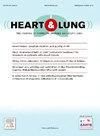Early Extubation failure predicts neurodevelopmental delay in infants after cardiac surgery: A retrospective cohort study
IF 2.6
4区 医学
Q2 CARDIAC & CARDIOVASCULAR SYSTEMS
引用次数: 0
Abstract
Background
Infants who undergo cardiac surgery are at increased risk of adverse neurological outcomes. Extubation failure, often seen in the immediate postoperative period, may be an early clinical sign of underlying physiologic instability. However, its long-term impact on neurodevelopment remains poorly understood.
Objectives
This study aimed to determine whether early extubation failure independently predicts neurodevelopmental delay (NDD) in infants 12–24 months following cardiac surgery.
Methods
We performed a retrospective cohort study involving 154 infants under 12 months of age who underwent cardiopulmonary bypass surgery between January 2016 and December 2022. Early extubation failure was defined as reintubation within 72 h after planned extubation. Neurodevelopmental outcomes were assessed using standardized developmental evaluations. Multivariate logistic regression was used to analyze the association between extubation failure and subsequent NDD.
Results
Extubation failure occurred in 16.9% of infants. Among those, 42.3% demonstrated NDD, compared to 18.6% in the successful extubation group. After adjusting for potential confounders, early extubation failure remained a significant independent predictor of NDD. Additional associations included prolonged ICU stays, higher sedative exposure, and increased readmission rates.
Conclusions
Early extubation failure following infant cardiac surgery is strongly associated with future neurodevelopmental impairment. This highlights the need for targeted extubation strategies, perioperative optimization, and structured developmental surveillance in this high-risk group.
Extubation failure may serve as a sentinel marker for early developmental surveillance.
早期拔管失败预测心脏手术后婴儿神经发育迟缓:一项回顾性队列研究
背景:接受心脏手术的婴儿出现不良神经预后的风险增加。拔管失败,常见于术后,可能是潜在的生理不稳定的早期临床症状。然而,它对神经发育的长期影响仍然知之甚少。目的本研究旨在确定早期拔管失败是否能独立预测心脏手术后12-24个月婴儿的神经发育迟缓(NDD)。方法:我们进行了一项回顾性队列研究,纳入了2016年1月至2022年12月期间接受体外循环手术的154名12个月以下婴儿。早期拔管失败定义为计划拔管后72小时内再次拔管。神经发育结果采用标准化发育评价进行评估。采用多因素logistic回归分析拔管失败与后续NDD的关系。结果16.9%的患儿插管失败。其中,42.3%出现NDD,而拔管成功组为18.6%。在调整了潜在的混杂因素后,早期拔管失败仍然是NDD的一个重要的独立预测因子。其他相关因素包括ICU住院时间延长、镇静暴露增加和再入院率增加。结论婴儿心脏手术后早期拔管失败与未来神经发育障碍密切相关。这突出了在这一高危人群中需要有针对性的拔管策略、围手术期优化和结构化的发育监测。拔管失败可以作为早期发育监测的哨兵标记。
本文章由计算机程序翻译,如有差异,请以英文原文为准。
求助全文
约1分钟内获得全文
求助全文
来源期刊

Heart & Lung
医学-呼吸系统
CiteScore
4.60
自引率
3.60%
发文量
184
审稿时长
35 days
期刊介绍:
Heart & Lung: The Journal of Cardiopulmonary and Acute Care, the official publication of The American Association of Heart Failure Nurses, presents original, peer-reviewed articles on techniques, advances, investigations, and observations related to the care of patients with acute and critical illness and patients with chronic cardiac or pulmonary disorders.
The Journal''s acute care articles focus on the care of hospitalized patients, including those in the critical and acute care settings. Because most patients who are hospitalized in acute and critical care settings have chronic conditions, we are also interested in the chronically critically ill, the care of patients with chronic cardiopulmonary disorders, their rehabilitation, and disease prevention. The Journal''s heart failure articles focus on all aspects of the care of patients with this condition. Manuscripts that are relevant to populations across the human lifespan are welcome.
 求助内容:
求助内容: 应助结果提醒方式:
应助结果提醒方式:


